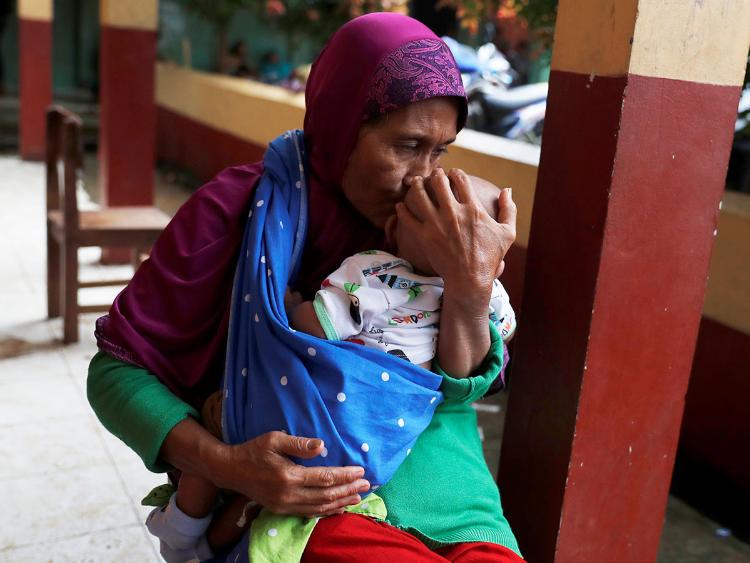Life and death choices for Indonesia tsunami victims
Udin Ahok was forced to make a choice that no one would ever want to make: save his wife or his mother and baby.

A woman holds a child at a shelter in Cigeulis, after a tsunami hit Banten province, Indonesia, December 25, 2018 Source: Reuters
The 46-year-old Indonesian had just gone to sleep on Saturday evening, December 22, when – without warning – a wall of water smashed into his house in Way Muli village on the coast of Sumatra.
Panicked, he fought to reach his sleeping 70-year-old mother and one-year-old son but then he saw his wife about to drown in the swirling waters.
He plucked her to safety and they survived the fury of a volcano-triggered tsunami that smashed into Indonesia's coast, killing more than 400 people who had no time to escape.
Ahok's mother and baby were found dead under mountains of debris.
"I didn't have time to save my mother and son," a weeping Ahok told Agence France-Presse from a local shelter for evacuees in one of the stricken region's hardest-hit areas.
"I regret it so much. I can only hope they've been given a place in God's hands."
Sulistiwati, another Way Muli resident who is 6 months pregnant, only survived thanks to a neighbor who saw her tumble into the salty water.
"Luckily, he spotted me and pulled me out of the wave and we ran to higher ground with our other neighbours," she said.
"It was pitch black. I didn't know I could run that fast being pregnant. It was so scary. We waited for a few hours until the water went down."
'I can't rebuild'
Across the Sunda Strait in Java island, Saki stood amid the rubble of what was once Sumber Jaya village and wondered aloud how he would get his life back on track.
"I can't rebuild, everything is gone – my clothes, my money," he told Agence France-Presse.
"I had 19 million rupiah ($1,300) inside the house," said the 60-year-old, who has been left with nothing but his white Muslim skull cap, a t-shirt, and a sarong.
"I'm sleeping at the mosque and every day I come back here because I had lots of money that has been lost inside (the house)."
Two people were killed and at least 20 houses destroyed in Saki's neighborhood, according to locals, who spent Christmas Day scouring through what was left of their homes for belongings.
The streets of Sumber Jaya are muddy, partly flooded, and covered in debris. Here and there mounds of timber, rubbish and bricks have been piled up on the roadside. The army is clearing the area with the aid of heavy machinery.
"When the tsunami hit the electricity suddenly went off and I heard a noise that sounded like the roar of a plane," recalled Ismail, a 62-year-old Sumber Jaya resident.
"I pointed my flashlight toward the sea and saw the wave...I ran into the forest up in the hills."
Ismail's home – and flock of goats – were spared by the killer wave. But in front of his inland house, the tsunami had wiped out everything in its path, knocking down shops and homes and leaving just a muddy patch of earth, strewn with timber, uprooted trees, and the mangled remains of a small amusement park.
"There was a gas station, grocery store, and spare car parts shop over here," Ismail said.
"They're all gone now. We have not got any help yet. We've only got muddy rice, but we're still going to cook it."
Back in Sumatra, Nasoha's body was covered in cuts and bruises and his house is gone.
But he sees himself as one of the lucky ones.
"I have a gash on my cheek and my arm and ear are also injured," the 45-year-old said.
"But I'm grateful we're alive."
VNF
Recommended
 World
World
US, China Conclude Trade Talks with Positive Outcome
 World
World
Nifty, Sensex jumped more than 2% in opening as India-Pakistan tensions ease
 World
World
Easing of US-China Tariffs: Markets React Positively, Experts Remain Cautious
 World
World
India strikes back at terrorists with Operation Sindoor
 World
World
India sending Holy Relics of Lord Buddha to Vietnam a special gesture, has generated tremendous spiritual faith: Kiren Rijiju
 World
World
Why the India-US Sonobuoy Co-Production Agreement Matters
 World
World
Vietnam’s 50-year Reunification Celebration Garners Argentine Press’s Attention
 World
World
